
THEORY IN BIOSCIENCES
metrics 2024
Advancing Theoretical Insights in Biosciences
Introduction
THEORY IN BIOSCIENCES, published by SPRINGER, is a prominent academic journal in the interdisciplinary fields of Applied Mathematics, Ecology, and Statistics. With an ISSN of 1431-7613 and an E-ISSN of 1611-7530, this journal is accessible to a global audience and facilitates Open Access options, ensuring that cutting-edge research reaches its intended audience promptly. Established in 1997 and set to converge into 2024, THEORY IN BIOSCIENCES holds a pivotal role in advancing theoretical and methodological approaches in biosciences, evidenced by its respectable placement in the Q3 quartile within the 2023 category rankings. Its Scopus rankings reflect a growing reputation, particularly in Mathematics and Ecology, making it an essential resource for researchers and professionals seeking to enhance their understanding of complex biological systems and data analysis techniques. Positioned in Germany and powered by SPRINGER's esteemed publishing standards, the journal is dedicated to fostering scholarly communication, offering a platform for innovative research that bridges theoretical frameworks and practical applications.
Metrics 2024
 0.29
0.29 1.30
1.30 1.30
1.30 41
41Metrics History
Rank 2024
Scopus
IF (Web Of Science)
JCI (Web Of Science)
Quartile History
Similar Journals

Markov Processes and Related Fields
Advancing Knowledge in Applied MathematicsMarkov Processes and Related Fields, published by POLYMAT, is a pivotal journal in the field of applied mathematics and statistics, aimed at researchers, practitioners, and students who seek to deepen their understanding of complex stochastic processes and their applications. With an ISSN of 1024-2953 and a convergence of scholarly work from 2012 to 2023, this journal not only contributes to the discourse around Markov processes but also positions itself within the competitive landscape of academic publishing, as evidenced by its Q4 ranking in both Applied Mathematics and Statistics and Probability for 2023. While the journal is not open access, it provides critical insights and developments that are essential for driving forward research in these fields. The journal's contributions enhance knowledge transfer among academia and industry, fostering innovation and application in various sectors. As researchers and students engage with its content, they will find a wealth of information that challenges conventional thinking and encourages novel approaches to statistical modeling and analysis.
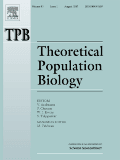
THEORETICAL POPULATION BIOLOGY
Advancing Theories in Population DynamicsTHEORETICAL POPULATION BIOLOGY is a leading academic journal published by Academic Press Inc. Elsevier Science, dedicated to advancing the understanding of population biology through theoretical frameworks and models. With an ISSN of 0040-5809 and an E-ISSN of 1096-0325, this journal has been a cornerstone in its field since its inception in 1970. Recognized for its significant contributions to the study of ecological and evolutionary dynamics, it currently holds a Q2 ranking in the Ecology, Evolution, Behavior and Systematics category as per the 2023 category quartiles. Researchers and professionals alike appreciate its role in disseminating impactful findings, as reflected in its percentile ranking of the 51st in Scopus for the Agricultural and Biological Sciences field. While the journal is not open access, it remains a vital resource for those looking to deepen their knowledge and research in theoretical approaches to population biology, making it an essential read for students, aspiring scientists, and veteran researchers seeking to engage with cutting-edge theoretical developments.
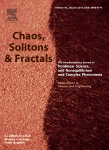
CHAOS SOLITONS & FRACTALS
Connecting Theories in Chaos and Fractal GeometryCHAOS SOLITONS & FRACTALS, published by Pergamon-Elsevier Science Ltd, stands as a premier journal in the fields of mathematical physics, applied mathematics, and nonlinear dynamics. With an impressive impact factor and a 2023 ranking placing it in the Q1 quartile for both applied mathematics and mathematical physics, this journal serves as an essential platform for groundbreaking research and innovative theories that explore the complex interplay between chaos, solitons, and fractal structures. Established in 1991 and converging research until 2024, the journal features rigorous peer-reviewed articles that appeal to academics, professionals, and students alike, facilitating the dissemination of knowledge within a community passionate about statistical and nonlinear physics. Although not open access, its rich content is critical for those seeking to deepen their understanding and advance their work in these dynamic and multifaceted areas of study.
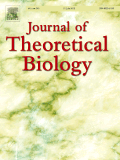
JOURNAL OF THEORETICAL BIOLOGY
Pioneering Theoretical Approaches to Modern BiologyJOURNAL OF THEORETICAL BIOLOGY, published by Academic Press Ltd - Elsevier Science Ltd, stands as a pivotal source of scholarly research in the domains of theoretical and applied biological sciences. Since its inception in 1961, this esteemed journal has contributed significantly to the advancement of knowledge across various fields, including agricultural sciences, applied mathematics, biochemistry, genetics, immunology, and medical research. With a commendable Q2 ranking in multiple categories for 2023, it showcases robust impact throughout the academic community, reflected in its high Scopus rankings, which place it in the top 25% of journals in several categories. The journal's commitment to fostering interdisciplinary research supports its objective of bridging theoretical frameworks with practical applications, making it an essential resource for researchers, professionals, and students alike. With its wide-ranging topics and a keen focus on innovation, the JOURNAL OF THEORETICAL BIOLOGY is indispensable for those seeking to explore the complexities of biological systems and their mathematical modeling.
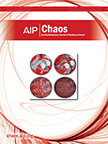
CHAOS
Unraveling the Mysteries of Dynamic ComplexityCHAOS, an esteemed journal published by AIP Publishing, is a cornerstone of interdisciplinary research, focusing on the intricate dynamics of complex systems across various scientific domains. With a balanced impact factor, this journal emphasizes high-quality contributions in Applied Mathematics, Mathematical Physics, and Statistical and Nonlinear Physics, while also exploring intersections with Medicine and Physics and Astronomy. With rankings showing a remarkable percentile placement, notably #7 in Mathematical Physics and #10 in Statistical and Nonlinear Physics, CHAOS has established itself as a leading platform for disseminating groundbreaking research since its inception in 1991. This journal not only aims to foster collaboration among scientists but also to advance theoretical and computational frameworks that unravel the complexities of chaotic systems. Researchers, professionals, and students alike will find rich insights and innovative theories within its pages, making it an invaluable resource in the pursuit of knowledge and understanding in the modern scientific landscape.

Bioinformatics Advances
Transforming Biological Research Through Computational ExcellenceBioinformatics Advances, published by Oxford University Press, is an esteemed academic journal that serves as a vital platform for the dissemination of innovative research in the rapidly evolving fields of bioinformatics and computational biology. With a promising E-ISSN of 2635-0041, this journal has made significant strides since its inception in 2021, achieving a commendable Q1 ranking in both the Computer Science Applications and Genetics categories, alongside respectable Q2 rankings in Molecular Biology and Structural Biology as of 2023. Though currently not an open-access publication, its critical insights cater to an audience keen on advancing knowledge and technology in genomic studies and data analytics. The journal emphasizes high-quality research and aims to facilitate the integration of computational techniques within biological sciences, making it an essential resource for researchers, professionals, and students alike who seek to stay at the forefront of bioinformatics advancements.

Mathematics in Applied Sciences and Engineering
Unlocking potential with cutting-edge mathematical applications.Mathematics in Applied Sciences and Engineering is a pioneering Open Access journal published by WESTERN LIBRARIES in Canada, dedicated to advancing the field of applied mathematics and its integration into engineering practices. With an E-ISSN of 2563-1926, this journal has been actively disseminating critical research since its inception in 2020, and aims to foster innovation and collaboration among researchers, professionals, and students alike. The journal excels in covering important topics within applied mathematics, modeling, and simulation, despite its current standing in the Q4 quartile for these categories according to the 2023 rankings, indicating significant opportunities for growth and contribution in these fields. Positioned in a competitive academic landscape—ranked #437 out of 635 in Applied Mathematics and #253 out of 324 in Modeling and Simulation—this outlet serves as an accessible platform for scholarly exchange, ensuring that emerging ideas and methodologies reach a broad audience while maintaining a commitment to academic integrity and quality.

SIAM JOURNAL ON APPLIED MATHEMATICS
Advancing Knowledge for Real-World SolutionsSIAM Journal on Applied Mathematics, published by SIAM Publications, is a leading academic journal that has been an essential resource for researchers and practitioners in the field of applied mathematics since its inception in 1969. With an impressive impact factor that places it in the Q1 category for Applied Mathematics and a respectable Scopus rank of #172 out of 635, this journal serves as a vital platform for sharing innovative research, methodologies, and applications that bridge theoretical mathematics and practical problems across diverse industries. Although the journal does not currently offer open access options, it remains a cornerstone of mathematical literature in the United States and worldwide, featuring rigorous peer-reviewed articles that address critical issues and advancements in the field. Researchers, professionals, and students are encouraged to engage with its rich repository of knowledge and contribute to the ongoing dialogue in applied mathematics, making it a must-subscribe journal for anyone invested in this dynamic discipline.
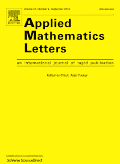
Applied Mathematics Letters
Showcasing Influential Research for a Mathematical TomorrowApplied Mathematics Letters is a prestigious journal dedicated to the dissemination of significant research in the field of applied mathematics. Published by PERGAMON-ELSEVIER SCIENCE LTD in the United Kingdom, this journal serves as a vital resource for researchers, professionals, and students alike, aiming to bridge theoretical findings and practical applications. With an impressive impact factor placing it in the Q1 category and ranked 33 out of 635 in the Applied Mathematics category by Scopus, it showcases influential articles that contribute to advancements across various applications of mathematics. The journal's coverage from 1988 to 2025 ensures a rich archive of research that remains relevant and insightful for contemporary studies. Currently, it operates under a subscription-based model, providing access to cutting-edge research that forms the backbone of mathematical application in science and engineering. To become part of this dynamic community of scholars, readers are encouraged to explore the latest findings and ongoing discussions that highlight the interplay between mathematics and its real-world impacts.

PLoS Computational Biology
Empowering Research with Open-Access SolutionsPLoS Computational Biology is a premier open-access journal published by the Public Library of Science, committed to advancing the understanding of complex biological data through computational approaches. Since its inception in 2005, the journal has made significant strides in the fields of Cellular and Molecular Neuroscience, Computational Theory and Mathematics, Ecology, Genetics, and Molecular Biology, achieving a notable Q1 ranking in various categories as of 2023. With an exceptional impact factor and an esteemed ranking—such as Rank #23/176 in Computational Theory and Mathematics—PLoS Computational Biology provides a vital platform for researchers, professionals, and students to disseminate their cutting-edge findings and insights. The journal's open-access model ensures that high-quality research is freely accessible worldwide, fostering collaboration and innovation across disciplines. Located in San Francisco, CA, it serves as a hub for the global scientific community, making it an indispensable resource for anyone at the forefront of computational biology and its diverse applications.